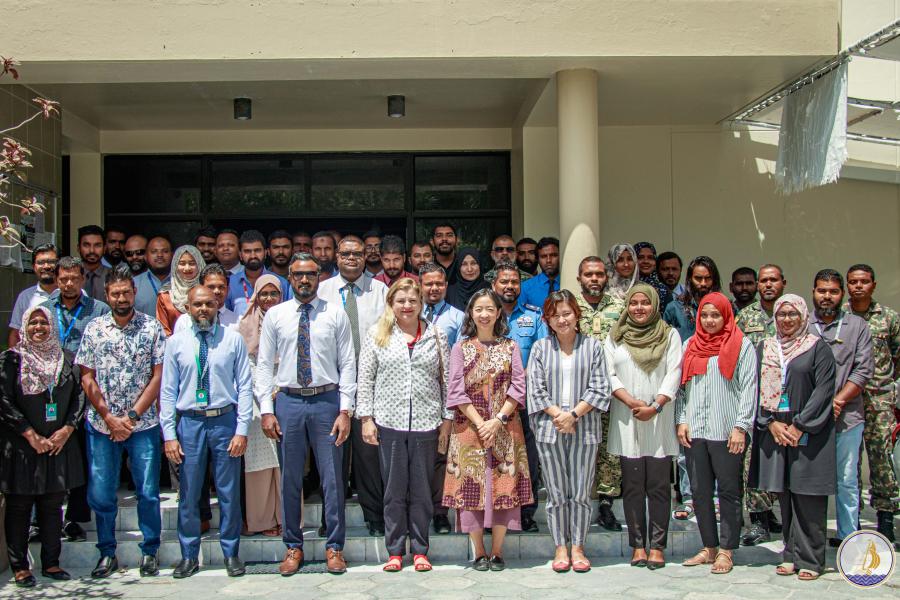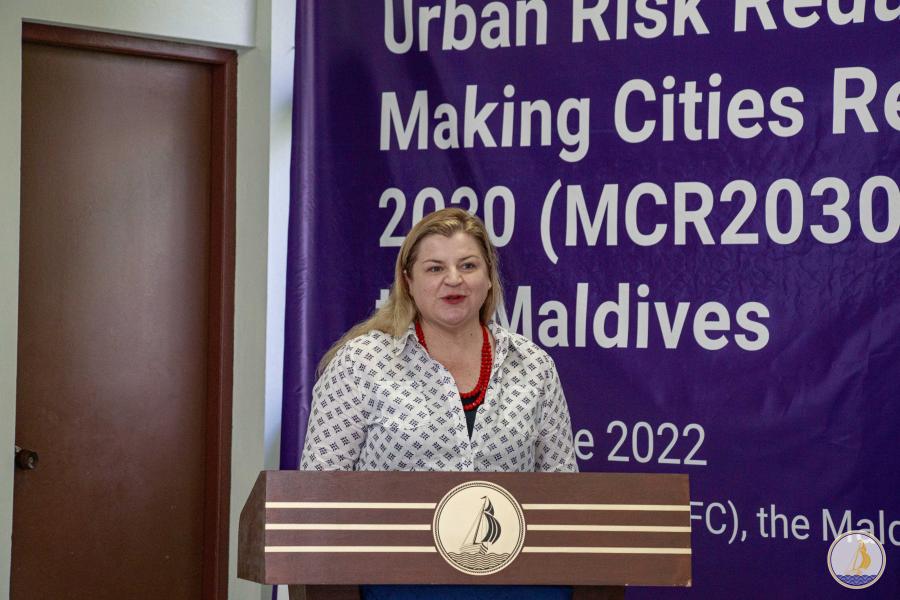Urban Risk Reduction and Making Cities Resilient 2030 for the Maldives
UN Resident Coordinator's Opening Remarks at the Technical Training on Urban Risk Reduction and Making Cities Resilient 2030 for the Maldives by UNDRR

Mr. Hisan Hassan, Chief Executive of National Disaster Management Authority
Mr. Mohamed Athif, Mayor Kulhudhuffushi City
Distinguished participants,
Ladies and gentlemen,
It is a great pleasure to be with you today at the opening of this Making Cities Resilient (MCR) 2030 training event.
I am particularly pleased to be with you in person, after so much time confined to Male. My most heartfelt thanks to the Mayor and Council for the warm welcome for my first of what I hope to be many, visits to Kulhuduffushi.
We appreciate the partnership and support provided from the NDMA, the Kulhudhuffushi City Council and the UN Office for Disaster Risk Reduction.
It is estimated that by 2050, nearly 70% of the world’s population will live in urban areas. With such rapid urbanization, cities continue to grow, and as a result, we see greater exposure to risk of lives, livelihoods and economic, social and environmental assets.
Under these circumstances, local governments and communities are on the frontline of disaster risk. It is also therefore, the reason why the greatest results can be achieved through building capacity and awareness of preparedness and response in communities such as yours. I am certain that you know this much better than I, and that the pandemic has provided multiple opportunities to test some of our planning assumptions and responses and finetune them to better adapt to future challenges.
Maldives has progressed rapidly in disaster risk reduction and climate change adaptation. Maldives has established a robust disaster risk management system to increase preparedness, resilience and the capability to adapt across different administrative levels.

The UN in the Maldives has been working to maximize the potential for inclusive and sustainable human development across the country.
This includes climate change adaptation and mitigation initiatives translated to the Maldives context, as proscribed by the Paris Agreement and the Sendai Framework for Disaster Risk Reduction.
In order to address multiple, multi-scale and systemic risks that cities and urban areas face, resilience strategies for disaster risk reduction need to work in conjunction with other frameworks. This includes the New Urban Agenda, with our common guiding light of the 2030 Agenda for Sustainable Development.
During the recent UN Economic and Social Council Special Meeting in New York in April, Member States discussed this particular matter on Sustainable Urbanization and the Implementation of the New Urban Agenda.
The President of the UNGA, his Excellency Abdulla Shahid, stressed that the New Urban Agenda must guide our efforts to address inequalities in urbanization in both developing and developed countries.
Moreover, we need to mobilize urbanization professionals from across the globe to work in partnership with other stakeholders at the local, regional and global levels.
One of the key underlying drivers of disaster risk is inadequate urban governance.
Resilient urban development goes hand in hand with poverty and inequality reduction, environmental management and climate change adaptation.
Strengthening urban governance to engage and empower citizens and build partnerships with civil society, the private sector and other stakeholders is the most important factor in addressing urban risk.
Therefore, local governments have made a commitment to make our cities more resilient to climate and disaster risks. That is why we have the Making Cities Resilient 2030 initiative.
This is the 2nd year of implementation for this initiative, and it is specifically supporting cities through the resilience roadmap to become more inclusive, safe and sustainable, directly contributing to the achievement of SDG 11.
MCR2030 also supports cities to access resources and tools for resilience building as well as to share peer-to-peer learning among different cities. Some of these tools will be presented and discussed during this training.
As mutual support and knowledge sharing are central to MCR2030, we encourage you to learn from each other, other cities and partners to understand the challenges and identify potential solutions.
We appreciate your active participation and collaboration during this training, which will certainly contribute to supporting the NDMA in developing an urban resilience programme to accelerate resilience building with local governments in the Maldives.
Starting with Kulhudhuffushi City, we hope to include more cities in the country so they may join the MCR2030 to make our cities safer, more resilient and sustainable.
I wish you the best for the next three days.
Thank you.


